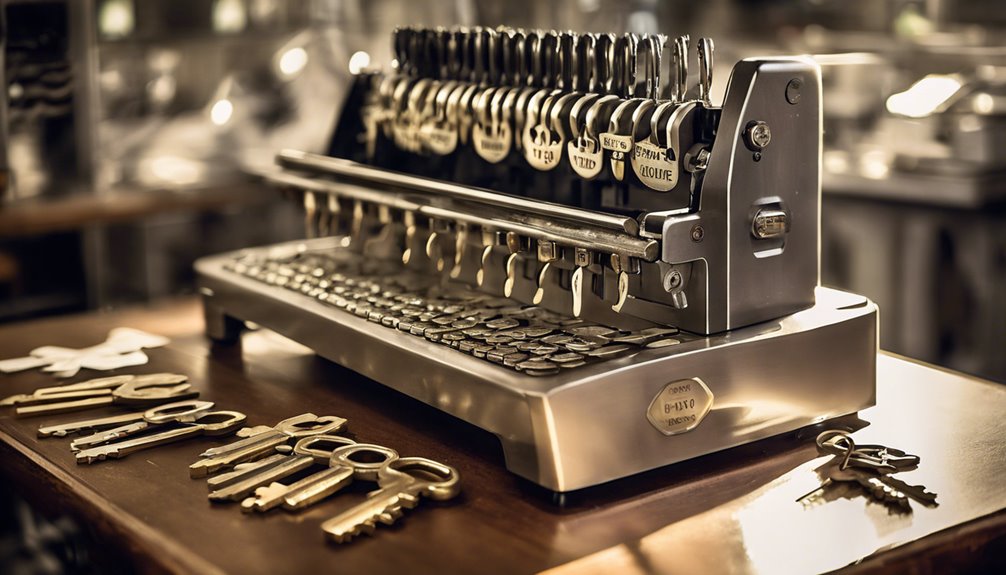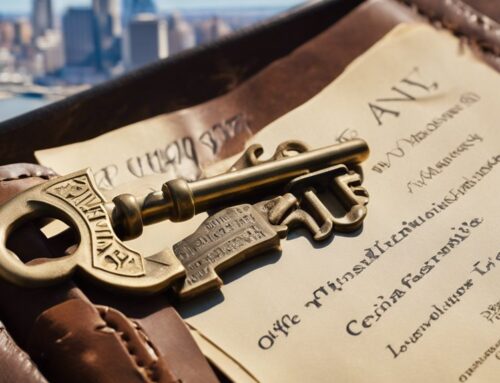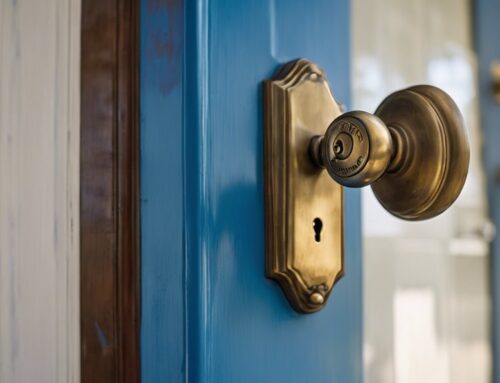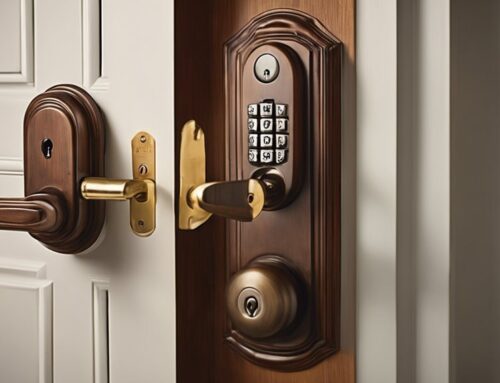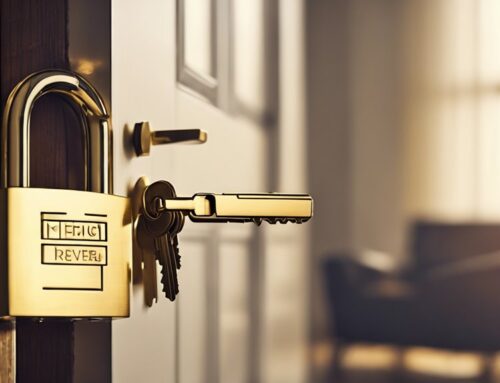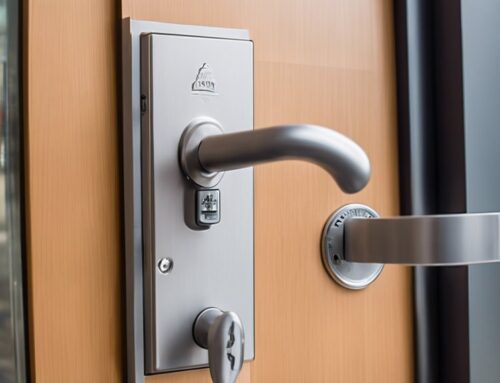Understanding the laws, recognizing the risks, and ensuring compliance are all essential for locksmiths in New Jersey. With key duplication regulations evolving, it's vital to grasp the nuances that could impact your business. You might think that simply following the basics is enough, but there's more complexity than meets the eye. If you don't stay informed, you could face serious consequences that might affect your reputation and livelihood. What should you really keep in mind to protect yourself and your clients?
Key Takeaways
- Key duplication laws in New Jersey prohibit unauthorized duplication and require verification of ownership for certain key types.
- Locksmiths must maintain accurate records of key duplications, including client identification to ensure compliance and avoid penalties.
- Keys marked "Do Not Duplicate" are not legally restricted; locksmiths can duplicate these but should exercise professional integrity.
- Non-compliance with key duplication regulations can lead to fines, license suspension, or legal action against locksmith businesses.
- Proper training and licensing are essential for locksmiths to stay informed about key duplication laws and security measures in New Jersey.
Overview of Key Duplication Laws
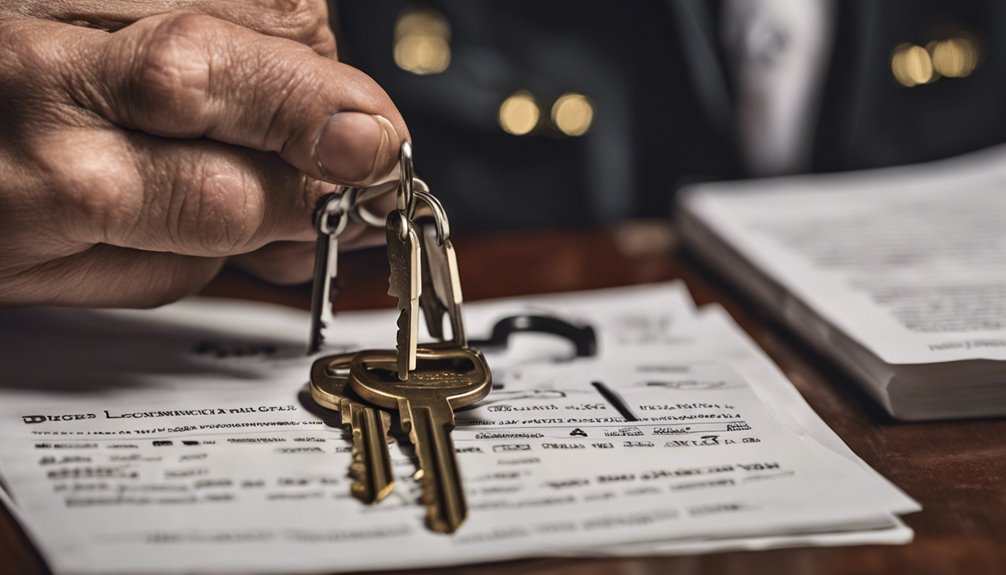
While key duplication might seem straightforward, New Jersey has specific laws governing the practice to protect against unauthorized access and misuse. Understanding these laws is essential, especially for those considering key duplication services or operating as locksmiths.
In New Jersey, duplicating certain types of keys can have serious legal implications. For instance, possessing motor vehicle master keys or devices intended to start vehicles without proper keys constitutes a fourth-degree crime if done unlawfully. Furthermore, you can't duplicate keys protected by patents, with fines reaching up to $10,000 for violations. Additionally, it is crucial to avoid actions that could lead to unlawful vehicle access, as this can result in severe legal consequences. Locksmiths must be aware of lock picking laws in New Jersey to ensure they comply with any regulations related to lock picking and the use of lock picking tools.
Although "Do Not Duplicate" keys aren't legally restricted, duplicating them could breach lease agreements or contractual obligations. Unauthorized key duplication can lead to significant fines, criminal investigations, and property violations. States often regulate on-site key-making as a safeguard against unauthorized access. Locksmith licensing in New Jersey is a critical aspect of ensuring practitioners adhere to these regulations and maintain public safety.
As a locksmith, it's imperative to comply with current state regulations to avoid repercussions. When it comes to legitimate key duplication, you must typically demonstrate proof of ownership and identification. This guarantees that requests are lawful, maintaining trust and accountability in the process.
Only authorized devices should be used for key duplication, adhering to professional standards to uphold legal and ethical practices.
Licensing Requirements Explained
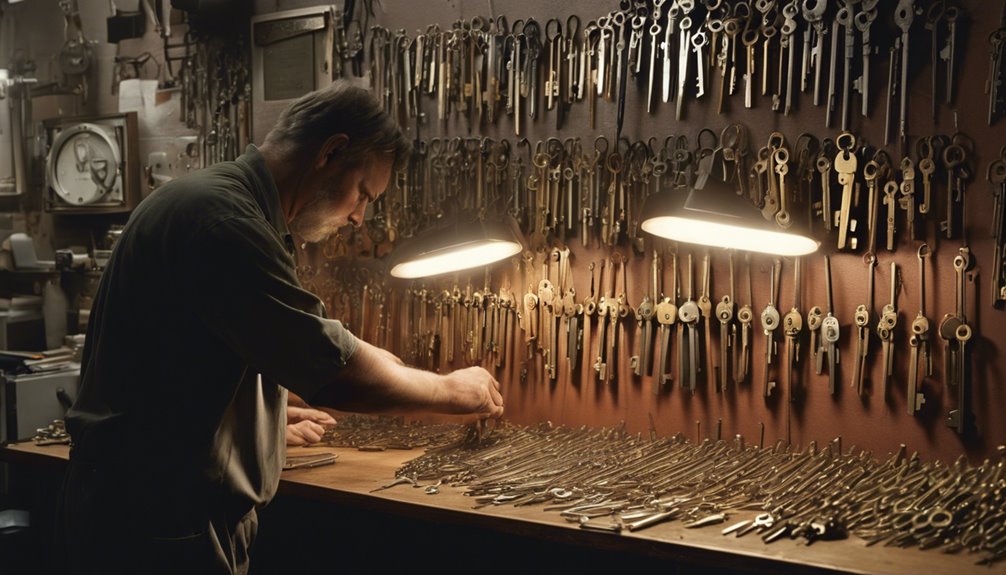
In New Jersey, obtaining a locksmith license requires meeting specific educational, moral, and experiential criteria. First, you're eligible if you're at least 18 years old and hold a high school diploma or an equivalency certificate. Notably, if you can demonstrate sufficient practical experience in the field, this educational requirement might be waived. There's no college degree needed, but you must have the foundational education.
Next, moral character plays a significant role. You must be of good moral standing, meaning you can't have any first, second, or third-degree felony convictions in the past ten years. A thorough background check will be conducted, requiring you to submit fingerprints, emphasizing the importance of integrity in this profession.
Experience is another cornerstone for licensure. You'll need at least three years—approximately 5,040 hours—of hands-on locksmithing experience, excluding managerial roles. Alternatively, completing a two-year apprentice program can fulfill this requirement. Your experience must also encompass specific training in areas like the Barrier Free Subcode and the New Jersey Uniform Construction Code, along with compliance with requirements essential for licensure. You should also be aware that lock change laws in New Jersey govern the procedures for changing locks in residential properties. In addition, navigating lock rekeying laws is crucial for both tenants and landlords to understand their rights and responsibilities.
Ultimately, you must pass a locksmithing examination and complete additional training hours focusing on significant legal aspects and safety regulations.
It's clear that New Jersey has put these licensing requirements in place to guarantee that only qualified, trustworthy individuals can practice locksmithing, thereby ensuring the safety and security of all residents.
Exemptions From Licensing

In New Jersey, specific individuals and roles can find exemptions from key duplication licensing requirements. For instance, those involved in public emergency services or performing key duplication using exempt key blanks don't need a license. Locksmiths play a critical role in eviction procedures in New Jersey by ensuring that all legal boundaries are respected during the process. Understanding these exemptions helps clarify who can operate without the constraints of licensing while ensuring safety and compliance. Additionally, becoming aware of the role of professional locksmiths can aid in understanding the broader implications of key duplication practices. Furthermore, employment laws for locksmiths in New Jersey include aspects such as wages, working conditions, and rights, which are essential for maintaining a fair and safe workplace.
Government Emergency Services
When emergency services are performed under the direction of a governmental entity, they benefit from specific exemptions from licensing in New Jersey. These exemptions are explicitly outlined in N.J.S.A. 45:5A-28, permitting individuals to perform public emergency services without the typical licensing requirements.
However, it's important to highlight that these exemptions apply strictly to specific emergency-related tasks and don't extend to general locksmithing services.
Individuals conducting exempt services must operate under clear governmental direction, guaranteeing accountability and compliance with state laws. This provision isn't meant for businesses or general practitioners; it solely applies to individuals acting in response to public emergencies.
The enforcement of these exemptions falls to the Fire Alarm, Burglar Alarm, and Locksmith Advisory Committee, which guarantees that all activities remain within the defined scope of public emergency services. State regulations ensure that licensed locksmiths are qualified to handle various security needs, reflecting the importance of adhering to industry standards.
No background checks or licensing are mandated for those performing exempt services, highlighting a focus on immediate response rather than bureaucratic delays.
Adherence to the precise definition of exempt activities is vital, as deviating into routine locksmithing could lead to legal complications. Therefore, understanding these boundaries empowers you to operate effectively within the framework of New Jersey law. Additionally, businesses and homeowners should be aware of high-security lock standards in New Jersey, which are crucial for upgrading their security systems.
Key Duplication Exceptions
Although key duplication generally requires a license in New Jersey, several exceptions allow specific individuals and businesses to perform these tasks without the usual regulatory barriers.
For instance, sales representatives offering demos to licensed locksmiths are exempt, as are automotive service dealers and lock manufacturers while servicing their products. Additionally, members of trade unions involved in new construction or renovations can duplicate keys without licenses. Locksmith services that operate 24/7 with round-the-clock protection can provide additional security solutions.
Certain activities also fall under exemptions. For example, making duplicate keys (except "do not duplicate" or master keys) and modifying locks as intended by the manufacturer are allowed. In New Jersey, commercial and residential lock systems must comply with specific safety standards to ensure the security and safety of buildings and their occupants.
Mechanics and auto dealers can repair automotive locks freely, as can security technicians when installing replacement locks.
Moreover, licensed alarm businesses can duplicate keys incidental to their services, while electrical contractors regulated by the Board of Examiners are similarly exempt.
Even for keys that carry "do not duplicate" markings, duplication isn't legally forbidden; businesses may make copies if ownership is provable.
Ultimately, understanding these exceptions can help you navigate key duplication laws more effectively, ensuring you operate within legal guidelines while maximizing your service capabilities.
Practical Experience for Locksmiths

Three years of practical experience is vital for anyone looking to become a licensed locksmith in New Jersey. This requirement guarantees that you have ample hands-on experience in locksmithing services, allowing you to execute your duties effectively and safely. Your experience must total at least 5,040 hours, defined as full-time work, which means working at least 20 days per month over three years.
If you find it challenging to meet the experience requirement, an alternative is to complete a two-year apprenticeship program. This program must be approved by the U.S. Department of Labor and focuses on the same locksmithing principles. Below is a breakdown of the practical experience requirements:
| Requirement | Details |
|---|---|
| Total Experience Hours | Minimum of 5,040 hours in locksmithing services |
| Type of Experience | Hands-on locksmithing; no supervisory roles |
| Activities Covered | Installation, repair, and maintenance of locks |
| Apprenticeship Option | Two-year program as a substitute for experience |
Your experience must directly relate to locksmithing activities, excluding tasks like key duplication for non-restricted keys. To achieve licensure, you'll need to provide verifiable documentation of your hands-on experience or apprenticeship. Confirm that your records are detailed and meet state standards, as accurate documentation is vital for your licensing journey. In this way, you'll build a strong foundation for your future career in locksmithing. Additionally, businesses in New Jersey should ensure that their locks are ADA compliant to meet accessibility standards.
Training Requirements for Licensing
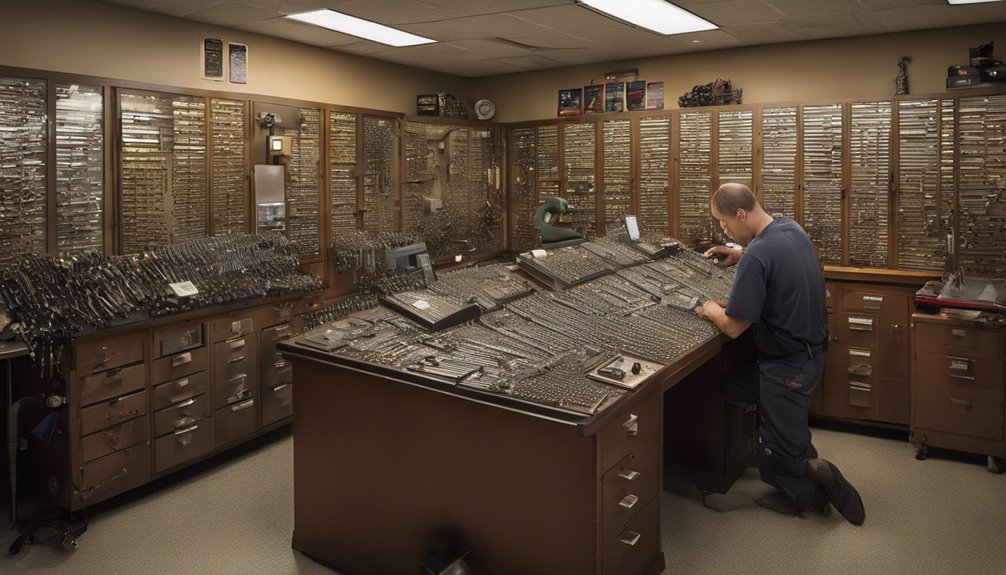
To become a licensed locksmith in New Jersey, you'll need to fulfill specific training requirements that lay the foundation for your career. First, you must be at least 18 years old and hold a high school diploma or an equivalency certificate. While there's no need for a college degree, your basic education prepares you for further training in locksmithing.
To get started, enroll in accredited locksmith training programs. These can be found through online courses, classroom settings, or vocational schools, often offered by local community colleges. The training covers essential topics, including lock types, key cutting, and lock picking techniques. Completing these programs equips you with the practical skills necessary for the locksmith examination.
The next step involves passing the locksmithing examination as stipulated in N.J.A.C. 13:31A-2.3. This exam tests your knowledge and skills in locksmithing, ensuring you meet the state's standards of professionalism and competence. A passing score is vital for licensure.
In addition to core training, you'll need to complete specific training on the Barrier Free Subcode, New Jersey Uniform Construction Code, Americans with Disabilities Act, industrial safety, and state laws. This requirement includes two hours of training in each area.
While additional certifications offered by organizations like the Associated Locksmiths of America aren't mandatory, they can enhance your credibility and may involve continuing education to maintain them. By meeting these training requirements, you're well on your way to establishing yourself as a licensed locksmith.
Business Operations for Locksmiths

When running your locksmith business in New Jersey, you're required to adhere to strict licensing compliance requirements, including maintaining a physical location in the state.
You'll also need to implement key duplication policies and establish protocols for emergency services, ensuring swift responses to customer needs.
Understanding and following these regulations is essential to operating legally and effectively in the locksmith industry.
Licensing Compliance Requirements
Understanding the licensing compliance requirements for locksmith businesses in New Jersey is essential to your operational success. First, you must meet the eligibility criteria, which include being at least 18 years old, holding a high school diploma or its equivalent, and demonstrating good moral character—meaning no serious criminal convictions within the last decade.
You'll also need to pass the locksmithing examination and undergo a criminal history background check.
Practical experience is another critical aspect. You need three years of hands-on experience, clocking in at least 5,040 hours, or you can complete a two-year apprenticeship approved by the Bureau of Apprenticeship and Training.
Additionally, specific training in areas like the New Jersey Uniform Construction Code and the Americans with Disabilities Act is mandatory.
When it comes to operations, your business should maintain an office within New Jersey and clearly mark service vehicles. If you offer electronic security services, you need a 24-hour emergency contact.
Don't overlook insurance requirements; you must carry at least $500,000 in general liability and a surety bond of $10,000. Compliance with these requirements guarantees you operate legally and effectively in New Jersey.
#
Key Duplication Policies
Key duplication policies in New Jersey play an essential role in ensuring the security and integrity of locking mechanisms.
As a locksmith, you must be aware that keys marked "do not duplicate" or designated as "master keys" can't be duplicated without proper authorization. These must be clearly labeled to prevent unauthorized duplication, which could lead to serious disciplinary actions against you.
Exemptions exist for automotive service dealers, lock manufacturers, and trade union members working on new construction, allowing them to duplicate specific keys without restriction.
However, this doesn't extend to most locksmiths, who must utilize key duplication machines exclusively for non-restricted keys.
Maintaining accurate records of every key duplication is vital. You must obtain personal identification from clients and document essential details about the key type and client identity.
Access to these records must be readily available for law enforcement if required.
Non-compliance with these policies can lead to severe penalties, including license suspension, fines, and potential civil litigation.
Understanding and adhering to New Jersey's key duplication policies not only promotes professionalism but also safeguards your business from legal repercussions.
Emergency Services Obligations
For locksmiths operating in New Jersey, fulfilling emergency services obligations is vital for maintaining both compliance and customer trust. You must guarantee that your business has a dedicated emergency service number manned 24/7. This number, whether your main line or a designated emergency contact, should be prominently advertised to inform your customers that help is always available.
When emergencies arise, it's essential to respond promptly and inform clients of the date and time service will be rendered, ideally within 24 hours of their request. This is especially important if your business provides electronic security system services as well.
Additionally, all service vehicles must be clearly marked with your business name, adhering to guidelines set forth in the New Jersey Administrative Code. Proper identification helps validate your services, while non-compliance can lead to regulatory repercussions.
Lastly, be aware of the liability insurance requirements: you need at least $500,000 in general liability insurance and a $10,000 surety bond. This not only guarantees you're protected, but it also fosters trust with customers, creating a solid foundation for your locksmith business in New Jersey.
## Key Duplication Policies

While locksmiths in New Jersey have the discretion to duplicate keys marked "do not duplicate," there's no law prohibiting the duplication of these keys. The inscription serves as a request rather than a regulatory mandate. This means you can legally choose to make a copy if the key's owner proves their ownership.
However, be mindful that many chain hardware stores might refuse this service due to corporate policies that exceed legal requirements.
Specialized keys, which often feature unique designs like dimples or multi-row cuts, can still be duplicated. Their complexity doesn't preclude you from creating a copy, unless the manufacturer or issuing entity specifically restricts it—which you should verify before proceeding.
As a locksmith, it's advisable to clearly communicate your key duplication policies to customers right from the start. This transparency can help mitigate misunderstandings and build trust.
Consumers should certainly ask about your specific duplication policy before purchasing locks. Remember, even though you may have the legal freedom to duplicate a key, your professional integrity and reputation hinge on ensuring that the owner's rights and the intent behind the 'do not duplicate' marking are respected.
It's essential to stay informed about the shifting landscape of key duplication policies and how your discretion plays a role. Keeping a keen eye on both customer needs and legal frameworks will enhance your practice and guarantee compliance with New Jersey laws.
Security Implications of Key Duplication
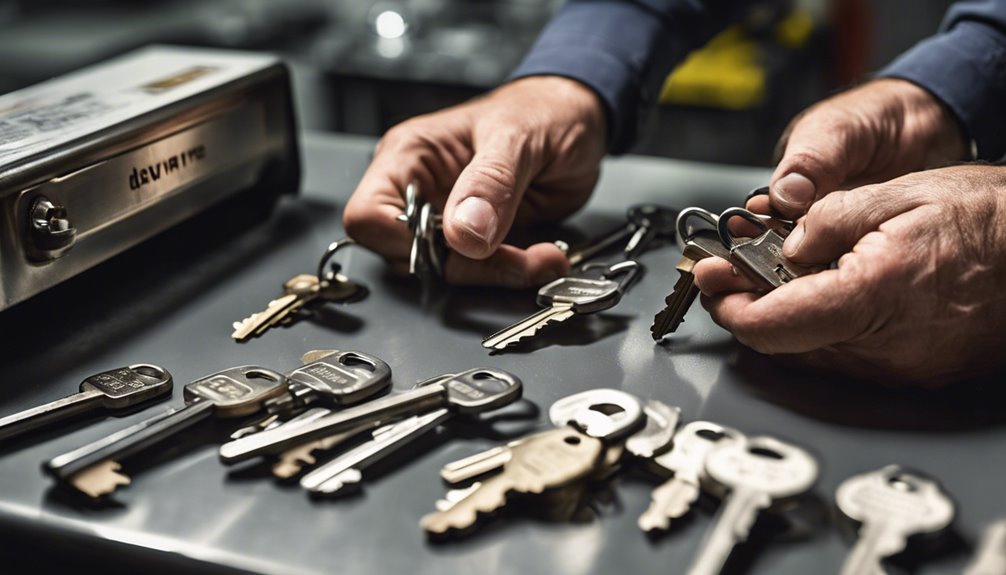
Unauthorized key duplication poses significant security risks for both residential and commercial properties, as it can lead to burglary or unauthorized access.
To mitigate these threats, you should consider implementing effective security measures, such as high-security keys and patented key systems, that restrict duplication.
When key duplication goes unchecked, it poses significant security risks that can jeopardize both individuals and organizations. Unauthorized key copies can grant unwelcome access to secure areas, undermining safety and exposing sensitive data or valuable assets.
In commercial settings, this uncontrolled access may lead to theft or loss, risking your company's integrity and bottom line.
Moreover, unauthorized duplication can disrupt established access protocols by allowing individuals to circulate freely within restricted areas. This not only complicates physical safety but can also create barriers when integrating traditional locks with modern electronic security systems.
Consequently, if a breach occurs, you may face extensive financial repercussions, including the costs of overhauling your security system and potential legal actions arising from theft or data breaches.
Unfortunately, there's no legal framework to prevent "Do Not Duplicate" keys from being copied, leaving you vulnerable. While law enforcement may intervene post-breach, the best defense is preventing unauthorized duplication in the first place.
Understanding these risks is vital to safeguarding your assets and ensuring compliance with existing policies and procedures. Your security hinges on your vigilance against unauthorized key duplication.
Effective Security Measures
To effectively safeguard your property and assets against the risks associated with key duplication, it's vital to implement thorough security measures.
Start by confirming proper authorization and verification before duplicating any keys. This means confirming identity and ownership while respecting the key owners' rights and privacy. Verify the credentials and licenses of locksmiths or key duplication services to assure legitimacy and accountability, maintaining records of all key copies made.
Quality and accuracy are also important. Use precise methods, such as manual key cutting or high-end automated machines, and always choose high-quality key blanks compatible with your locks. Avoid duplicating keys from other duplicates, as this can compromise quality. Test duplicated keys to verify they work effortlessly.
Establish robust security protocols, conducting regular audits of key systems and duplication processes to identify vulnerabilities. Train employees and residents on key security awareness, and collaborate with experts to evaluate your current key control policies.
Finally, comply with local regulations and legal requirements regarding key duplication, steering clear of unverified services that pose security risks. By taking these measures seriously, you'll enhance your overall security against key duplication threats.
Patented Key Systems
Patented key systems play an essential role in enhancing security by offering legal protection against unauthorized duplication. When a key design is patented, it grants exclusivity, preventing anyone other than the patent holder or their authorized agents from copying that key. This legal framework means that if an unauthorized copy is made, legal action can be taken, ensuring that security standards remain high throughout the patent's life.
However, it's vital to recognize that once a patent expires, that protection vanishes. Unauthorized individuals can then create copies of the keys, compromising security—especially for older systems that have been widely accessed. Buildings relying on expired patented systems increase their risk of burglary considerably.
Moreover, every key duplication introduces potential inaccuracies, affecting the key's integrity and functionality. As copies multiply, security diminishes, possibly leading to breaches.
As a result, ensuring accurate duplicates is key—using skilled locksmiths and advanced technologies can help preserve the quality of copies.
Best Practices for Locksmiths
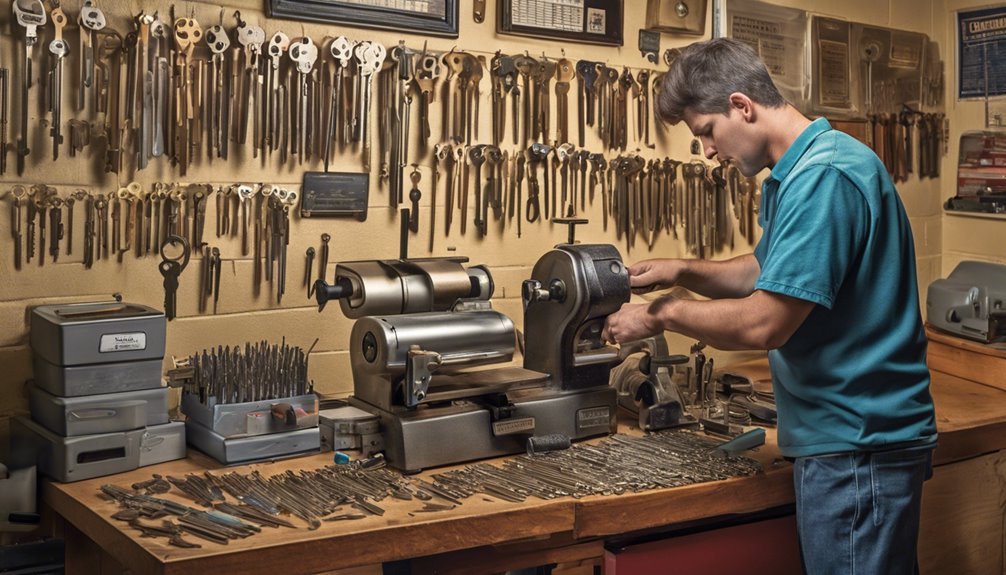
While guaranteeing compliance with licensing regulations is fundamental, adopting best practices can greatly enhance a locksmith's credibility and operational efficiency.
To maintain your license under N.J.S.A. 45:5A-1 et seq., you must continually practice with skill and safety. Stay updated on the regulations set by the Fire Alarm, Burglar Alarm, and Locksmith Advisory Committee, as non-compliance can lead to suspension or revocation of your license.
Understanding key duplication laws is essential. Remember that keys marked "Do Not Duplicate" aren't inherently restricted unless related to a master system. Always verify which keys you can duplicate, as certain keys may have restrictions imposed by owners or security systems. Your ability to clearly identify and communicate these boundaries to clients bolsters your integrity as a locksmith.
When providing on-site key-making services, confirm you verify the identity and authorization of the requestor. This not only safeguards your legal standing but also establishes trust with your clients. Adhere strictly to state regulations to avoid potential legal issues and fines.
Maintain meticulous records of your employment and professional history. Disclose any disciplinary actions and guarantee you keep records up to date, as this transparency is vital for license renewal.
Finally, continuously seek training opportunities to sharpen your skills and adapt to industry changes. By embracing these best practices, you cement your reputation as a knowledgeable and reliable locksmith.
Consumer Awareness Regarding Keys

Many consumers remain unaware of the intricacies surrounding key duplication and the implications of "do not duplicate" markings.
It's essential to understand that these markings serve as a request rather than a legal prohibition against duplication. There's no law preventing locksmiths from making copies of such keys, so the assurance they provide is misleading.
When it comes to key identification, many "do not duplicate" keys feature unique designs like two rows of cuts or dimples. However, this doesn't enhance security; a skilled locksmith can easily replicate these keys with the right tools.
While some chain hardware stores may refuse to copy these keys due to corporate policies, many locksmiths can duplicate them if you prove ownership.
This misconception creates a false sense of security, prompting consumers to neglect safer practices like secure key storage.
Additionally, consumers should familiarize themselves with the key duplication policies of their chosen locksmiths before making any purchases. If your locks are under warranty, you may also get free replacements for lost or stolen keys.
For ideal security, consider using patented key control systems, which effectively track key distribution.
Upgrading to high-quality locks that resist picking can further enhance your safety, rather than relying solely on "do not duplicate" labels.
Ultimately, remaining informed and vigilant about key duplication will empower you to make better choices to protect your property.
Frequently Asked Questions
Can I Duplicate a Key Without the Original?
Yes, you can duplicate a key without the original, but it often requires specific methods and proof of ownership.
You might use a key code or provide vehicle details for car keys. Advanced techniques, like impressioning, can also work, but they need expertise.
Remember, having documentation, like a driver's license or property deed, is essential to verify ownership and guarantee the duplication isn't for unlawful purposes.
Always consult a professional locksmith for assistance.
What Tools Are Needed for Key Duplication?
"Don't put all your eggs in one basket" when it comes to key duplication tools.
You'll need a reliable key cutting machine, like the HPC Mini Speedex or Ilco Flash 008, along with precision molds and dual-component impressioning materials for accuracy.
Utility knives and casting tools help shape keys precisely.
With the right setup, you'll guarantee efficient, high-quality duplicates, empowering you to meet your clients' needs swiftly and effectively.
How Do I Ensure Key Security at My Business?
To guarantee key security at your business, implement a thorough key management system.
Start by maintaining a detailed inventory of keys and restrict access based on roles. Use restricted keyways and regularly change locks, especially after personnel changes.
Introduce access control systems, including biometric scanners or keycards, to monitor entry.
Educate your staff on security best practices guaranteeing they're aware of potential risks associated with unauthorized key use.
Regularly review and update your security measures.
Are There Restrictions on Duplicating Old Keys?
Yes, there can be restrictions on duplicating old keys, especially if they're marked or part of a restricted system.
While keys with "Do Not Duplicate" markings don't legally prevent duplication, it's wise to be cautious.
If your key is part of a high-security system, you'll need authorization to get duplicates made.
Always check local laws and policies, as unauthorized duplication may lead to penalties or legal issues.
Imagine you're the gatekeeper to your own fortress; a stolen key opens your defenses.
If someone duplicates your key without permission, act swiftly. Change your locks immediately to regain control.
Document everything—keep records of the incident, and consult a locksmith to discuss security upgrades.
You might also want to report the situation to local authorities or seek legal advice if you feel threatened.
Protecting your space should always be a top priority.
Conclusion
In traversing the maze of key duplication laws in New Jersey, it's vital to stay informed and compliant. By upholding security standards and respecting ownership, you safeguard not just your business but also the trust of your clients. Picture your locksmith shop as a fortress, where each key is a potential gateway; your diligence in following regulations guarantees that only the rightful hands can turn those locks. Prioritize best practices, and keep your profession's integrity shining bright.

